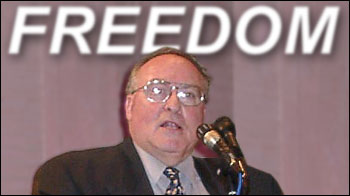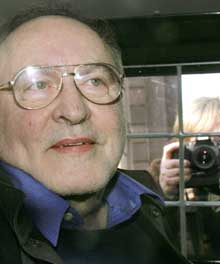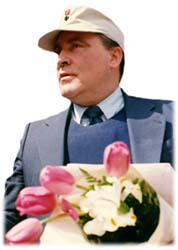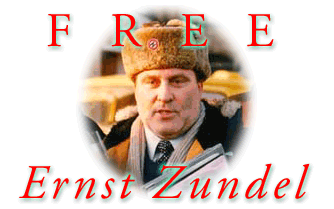|
|
March 20, 2005

[Download
MP3 of show]
An interview with Mark Weber
of the Institute for Historical Review.
by Kevin Alfred Strom
American Dissident Voices broadcast of 12th March, 2005
download
the broadcast (mp3)
On this week's program Mr. Strom continues his interview with the
spokesman for the Zundel family, historian Mark Weber. Ernst Zundel --
imprisoned for publicly doubting Zionist myths -- personifies the struggle
for freedom of speech, freedom of thought, and freedom of inquiry. His
struggle for freedom is our struggle for a decent and free future for our
posterity.
ON TODAY'S PROGRAM we continue our update on the Zundel case, as Mr. Zundel,
one of the world's foremost political prisoners and prisoners of conscience
is newly imprisoned in Mannheim prison in Germany for the "crime"
of doubting the court historians and the Jewish supremacist and Zionist
lobby's view of history. I don't believe there is any clearer case in the
world of a man who is in prison because of the dictates of his conscience
and his determination to use his voice and pen to state the truth as he sees
it. It is not an exaggeration to say that the fate of freedom in the West
will be affected for decades to come, perhaps even centuries, by what is
happening to Ernst Zundel right now.
In just a moment, we will be joined by Mark Weber, historian and Director of
the Institute for Historical Review, on American Dissident Voices.
KAS: I wonder what would happen if 1,000 men showed up if front of
Mannheim prison and stated on placards, or just stated with their loud
voices, that they, too, doubted the Jewish version of WW II history...

A typical cell in Mannheim
where Ernst Zundel is being held
MW: Well, I think demonstrations can really be effective in this
because there's less and less will to enforce these ridiculous laws, these
anti-Free Speech laws, because they run so counter to the principles that
the country claims to uphold. At the same time, Ernst Zundel is so blunt and
forthright in his views that even many nationalists in Germany are fearful
of associating themselves with him because they want to say "no, no,
you see, we're nationalists, or we're 'this' -- but we're not like that
Ernst Zundel."
Zundel is a provocative man; he's often deliberately provocative. That's a
strength but it can also be a source of weakness at times. But, overall,
Ernst Zundel's courage and his feistiness have been some of his greatest
strengths.
 KAS:
I saw one photograph, on the newswires, that showed Ernst Zundel on arrival
at the German prison, and he was smiling, looking very upbeat. Is there any
word on how his spirits are right now? KAS:
I saw one photograph, on the newswires, that showed Ernst Zundel on arrival
at the German prison, and he was smiling, looking very upbeat. Is there any
word on how his spirits are right now?
MW: I talked to him just hours before he was put on a plane and sent
to Germany. It was the last phone conversation we may have in years. And, as
usual, Ernst Zundel's mood is three things simultaneously.
First, he's a person who's realistic; he's not under any illusions about the
situation he's in.
Second, he's upbeat. He's eternally an optimistic man who tries to see the
best of any given situation but, at the same time, his view is tempered with
a sober realism.
Third, he was philosophical. I was very struck by how he sees his fate as
part of a larger unfolding of events, and sees himself as a man who's
playing a role -- an important role, but just one role -- in a very large
unfolding drama. He says "fate is not done with me yet." He said
he'd survived fire-bombings, assassination attempts, imprisonment, an
enormous legal campaign by powerful Jewish organizations in Canada, and he
said all that didn't happen just so everything ends now. When he says fate
is not done yet with Ernst Zundel, I think he's quite right about that.
This combination of a kind of philosophical view of himself, and an utter
lack of any self-pity, and realism, and optimism, are characteristics of
Ernst Zundel's personality that struck me when I first met him in 1988, and
I think they characterize his general character and personality.
KAS: Is there any hope at all for anything from the Canadian or
American courts to stop this circus and get Ernst home? Or have all of those
avenues been exhausted?
MW: In Canada I think the chapter's really closed on doing anything
there; I don't think any more can be done there. In fact it's almost a fluke
that, after he was taken from the United States, he was even taken back to
Canada. If a few things had gone differently, he might've been put on a
plane and sent directly to Germany at that time.
Here in America, attorneys representing Ernst Zundel are still fighting to
overturn his deportation and the order banning him from the United States
for 20 years. It's a pretty outrageous thing. But given the powers that have
been given to the government -- especially in the wake of September 11th --
and the fact that Ernst Zundel is not a US citizen, it's going to be very
difficult to overturn that. The real battle is going to be fought in Germany
now.
KAS: Is Ernst Zundel adequately represented in Germany?
MW: Without going into detail, I understand that he is. My
information is that the main attorney who's representing him is really a
first-rate, capable man. We have yet to see what's going to happen but, so
far, yes. Over the next several weeks, it'll be very revealing to see what
his legal recourse is going to be and how exactly he's going to fight it.
KAS: The language of the prosecution and the defense will be German,
and the events will no longer turn on American or Canadian decisions. Will,
in your opinion, this make the story disappear in North American media?
MW: Yes, largely. Largely I think it will, and it's also going to be
harder to raise money for his legal defense because it's difficult in the
European context to raise money for legal defense in the same way we're used
to doing here in the United States or in Canada -- the situation's
different. But, again, I think we're just seeing really the bare beginnings
of it and there's many different ways this could play out.
KAS: You're not planning on a diminution on coverage in your own
alternative media, the IHR web site, are you?
MW: We've been giving a lot of coverage to all of this. Not just
because of the very important role he played during the 1980s and in
bringing out a fabulous amount of new information on the Holocaust and the
Second World War, but also because he's spoken twice at IHR conferences --
he was at the very first IHR conference in 1979; and because he's a friend:
I've known him, and I've testified on his behalf... we feel a kinship and a
relationship for those reasons. And also he is the personification right now
in the world of the struggle for free historical inquiry and free historical
expression. He's been the number one political prisoner in North America,
he's now an important political prisoner in Europe, and he deserves the
support of everyone who cares about free speech and free inquiry.
KAS: How are Jewish groups reacting to these events?
MW: Predictably, the Simon Wiesenthal Center in Los Angeles and the
Anti-Defamation League in New York immediately issued a crowing, exultant
press release applauding (of course) the transfer of Zundel to Germany, and
his arrest there. I cannot stress it too highly: These organizations have
been gunning for Ernst Zundel for many years and they have been doing
everything they can to silence him.
KAS: Paul Fromm recently told the media that this is "coming at
a very volatile time. There's a lot of discontent in Germany in right now
and Ernst Zundel may well be a rallying point for Germans who are sick and
tired of hearing about the holocaust and German guilt." We saw members
of the major German nationalist party, the NPD, walk out during a Jewish
Holocaust ceremony and also openly call the allied attack on Dresden a
"Holocaust of Bombs." How is Ernst Zundel going to alter the face
of the historical debate in Germany, and will he find allies there?
MW: The extent of which he'll find allies is not yet clear. But it is
true the mood is changing in Europe. There's a greater awareness, by a new
generation, that people other than Jews were victims in the second World
War.
You know it's especially ironic that we hear so much about the Holocaust;
"holocaust" means a consuming by fire. Literally hundreds of
thousands of Germans were consumed in a holocaust during the second World
War -- victims of terror bombings in that terrible conflict. More and more
Germans are not willing to just be silent when we hear over and over about
one category of victimization -- and nothing about the suffering of other
people during the Second World War.
You know this just can't go on like it has. The Holocaust campaign over the
last 20 to 30 years has increasingly shifted the finger of blame -- and
pointed it not just at Germans or "Nazis," but at all Europeans
and, indeed, all of humanity. Humanity is more and more collectively
regarded by Jewish organizations as having this guilt, or responsibility,
for what's alleged to be the greatest crime in history. This is
impossible over the long run to pull off. Some people will sort of go
along with it, but it's absurd on its face and it's the logical extension of
how Jews see the Second World War and the Holocaust. They see it as part of
a larger historical drama, in which there's a constant struggle between
non-Jews and Jews, and Hitler is regarded as the most recent of a long line
of leaders who have been anti-Jewish.
KAS: Well, they keep wailing that 'the world is against us'; it seems
to me that if they wail long enough, it may become a self-fulfilling
prophecy.
MW: It's not going to go on forever, that the world will just go
along with this lament. It may resonate with Jews, but it isn't going to
resonate with non-Jews forever. We're seeing, really, I think, all over the
world, a real change in that regard. The treatment of Ernst Zundel really
points up he's not a perpetrator, he's a victim.
This is an important thing. Palestinians are victims of Jewish power. Around
the world there's a greater and greater awareness that Jews wield a
tremendous power in our society and are going to use it to oppress, to carry
out war and destruction... this awareness cannot help but play a role in all
this. Now that may be a process of awareness too slow to help Ernst Zundel
immediately, but the mood is changing all over the world.
KAS: I don't know who said it first, but it has been said that
"we're all Palestinians now" and, in a sense, I think people are
waking up to that.
MW: I'm very pleased that there's an increasing world-wide awareness
about the forces that brought about the Iraq war. The same President that
lied to the public to carry out this war against Iraq is now agitating,
along with his neo-con friends in the White House, for war against Iran and
Syria. This should make it obvious to everyone this isn't a war about oil;
it's a war, as Senator Hollings of South Carolina said, to secure Israel.
This is a conflict for Jewish interests.
The world has no interest in war in Iran. The only country and the only
group that has an interest in war against Iran is Israel and organized
Jewry. A war against Iran would be catastrophic, would be terrible, and the
whole world knows this. But Israel and Jewish groups are pressing for war
against Iran or against Syria and the cost, unfortunately, will be a very
high one paid, not by Israel and American Jews, but paid with lives and
blood and treasure of millions of people in the United States, in the Middle
East, and other places.

KAS: All of them as innocent as Ernst Zundel.
Mr. Zundel is 65 years old, Mark. And he stands accused of speech crimes
that could earn him significant prison time in Germany. Do you think that he
will be convicted and, if so, will he spend the rest of his life in jail?
MW: I don't think he'll spend the rest of his life in jail. It's even
questionable whether he'll be convicted. As I say, the charges against him
are not only absurd but they're very flimsy. He's being charged with
"Holocaust denial" on the basis of articles on a Web site in the
United States that he doesn't even control. He might still be found guilty,
as absurd as that is, but, even so, it's hard to imagine how he would be
held for the rest of his life -- even if he is found guilty on that absurd
change.
KAS: What sort of sentence do you think would be meted out? Two
years... three years... five years... if he's convicted?
MW: Based on what's happened to others, who have been in a similar
situation, generally the sentences have been running about a year and a half
-- something like that. In prison, I mean. Of course there are other people
who are punished with fines and punished in other ways. Sometimes the
sentences are suspended. Gunter Deckert was, I think, sentenced to 15 months
in prison for being an interpreter for a talk given by Fred Leuchter in
Germany. David Irving, for making a statement at a meeting in Munich, was
fined, I think, 30,000 marks and banned from the country; so, in his case,
he wasn't arrested, and he wasn't jailed. That's kind of the range of the
level of punishment in these cases. I guess the good news is that, even if
he's found guilty, it's not so likely that he would be held for as long as
he was just held -- for two years in solitary confinement in supposedly
"free and democratic" Canada.
KAS: That's good news in a way -- if it turns out that way. I suppose
then the focus would switch to becoming reunited with his wife and fighting
to be able to return to his home in Tennessee, if he can actually do that.
MW: Right. Zundel was correct when he said that Providence is not
done with him yet. It's ironic that all he wanted to do was live rather
quietly in Tennessee with his wife and paint pictures. Fate has thrust him
onto the world stage again.
KAS: Ernst Zundel has always been a man who can take a bad situation
and do something positive with it. He's a man of great creativity and
energy. He took the false news trials, and the Web site trials, and the
latest sham proceedings, and turned them (for anyone who would listen,
anyway) into a damning indictment of the Jewish power structure -- and its
lies, its distortions, its outrageous corruption and manipulation of the
legal system. Now he'll be on trial again, this time just for speaking his
mind -- and in the country which has been the focus of both the Jews'
efforts to vilify, and Zundel's efforts to set the record straight. I
predict there will be fireworks. What do you think?
MW: That's what I hope. And you're right: Ernst Zundel has never been
one to just take things lying down, and he's always been a man to make the
most of any situation. It's going to be incumbent upon us to do everything
we can to keep things up, and increase awareness about all of this. I've
been very encouraged by the expression of support -- even before Ernst
landed in Germany -- that we've seen from Germany just in the last couple of
days that he's been there now.
KAS: What can our listeners do to help Ernst in his fight for his
freedom?
MW: They can organize demonstrations and write to German consulates
and embassies in the countries where they live. They can inform themselves
about the case. There's a tremendous amount of information, not only on just
what's been happening recently, but background information, on the IHR site
at ihr.org. Beyond that, they can also contribute money to the legal defense
campaign by going to the Zundelsite, and of course they can support the IHR,
and our efforts as well. But what exactly are going to be the most effective
things to do after that, I think will be more obvious within the next few
weeks.
KAS: Mark, we're going to be watching the situation with Ernst Zundel
in Germany very closely. We're going to be giving his fight for freedom, and
freedom of expression, a lot of publicity on www.nationalvanguard.org,
and on this radio program, and I want to thank you for being a part of that.
I want to thank you for being a stalwart friend to Ernst Zundel and a friend
of freedom of speech, and for helping bring the truth to light through your
work with the Institute for Historical Review. Thank you very much.
MW: Thank you, Kevin, and you deserve tremendous praise yourself for
the work that you've been doing.
* * *
The January-February 2005 issue of National Vanguard magazine, our
125th, is now available for purchase from National Vanguard Books.
Bulk copies of the magazine -- 20 or more -- are also available at up to 50
per cent. off the cover price. Many of our members and supporters sell these
at flea markets, cultural events, and quite a number even distribute them
regularly to newsstands at a tidy profit.
National Vanguard magazine is a publication of the highest quality in
every sense of the word, one that you will be proud to show to your friends
and associates. This issue contains the following important features:
-> How You Can Help, an Editorial by Kevin Alfred Strom: National
Vanguard is a collaborative effort, and every reader can contribute in a
significant way to our success.
-> The Assault on Art and Beauty: Josiah Nott looks at the biological and
cultural reasons that make Jews tend to work against beauty and oppose all
manifestations of beauty, as we see it, in the art of the West.
-> The Sign Man: Ben Parker's fictional look at a man who changed the
world, even though he seemed to have nothing. "Seemed" is the
operative word in this case.
-> Situation Terminal, But Not Serious: Columnist and wit Bob Whitaker on
'The Legal Background to "Gay Marriage"'; 'Petty Tyrants,' a look
at what Canadian and American society may become as book-burning and
imprisonment without charge become a reality; and 'Both Sides Equal One
Side,' a comparison of Communist sham elections with American sham
elections.
-> Postscripts by Revilo P. Oliver: In 'The Price of the Head,' Professor
Revilo P. Oliver looks at an egregious case of corruption in the academy --
corruption that contributed to the deaths of thousands of Americans and the
betrayal of a sacred trust.
-> Holocaust Commemoration, Part II: Continued incisive analysis by Irmin
Vinson of the secular religion, driven by Jewish ethnocentrism, that is
growing up around the 'Holocaust.' This is the definitive treatment
of the subject.
-> And More!
You may subscribe or purchase individual or bulk copies of National
Vanguard magazine at this url:
http://www.natall.com/national-vanguard/125/index.html
or by writing to National Vanguard Books, Box 330, Hillsboro WV 24946 USA.
Subscription rates are $22 in the U.S., $30 in Canada, and $40 in the rest
of the world.
Until next week, this is Kevin Alfred Strom reminding you to keep on
thinking free.
===== ===== =====
|

|
Setting the Record Straight: Letters from Cell # 7
$10 - 180 Pages
Find out who this "premier thought criminal" really is -
how he thinks, how he writes, what he's really saying! You will
be astonished to learn why this man is so feared by the world's
manipulators of your thoughts!
Order form: HTML
format | PDF
Format |
Reminder:
Help free Ernst Zundel, Prisoner of Conscience. His
prison sketches - now on-line and highly popular - help pay for his defence.
Take a look - and tell a friend.
http://www.zundelsite.org/gallery/donations/index.html
|

Please write to Ernst Zündel, let him know that he is not
alone:
Justizvollzuganstalt Mannheim
Herzogenriedstr. 111
D- 68169 Mannheim
Germany
Tel. 49+621 3980, extension 217.
|
|
|